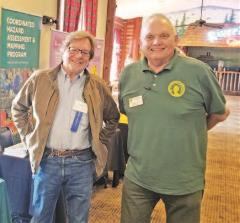State and local policymakers are taking a growing interest in healthy soil, and with good reason.
Improving soil health on farmland has many benefits. It can reduce flooding, store carbon in the soil, provide habitat for wildlife and improve profits for farmers and ranchers.
Impressive water-quality gains can be reaped through practices like growing winter cover crops, eliminating plowing and tilling and better grazing management.
In Iowa and Illinois, the League’s agriculture outreach coordinator, Tim Wagner, has been informing state and local officials about the benefits of healthy soils and advocating for state legislation that will support farmers working to restore the health of their land.
While Wagner's work focuses on two states, water pollution from agricultural runoff is a national problem that affects communities in many other states.
Improving soil health will require investment and commitments by policymakers and farmers, but it will pay dividends many times over by reducing polluted runoff, protecting drinking water, strengthening local economies and mitigating the worst effects of climate change.
Some of the ideas and innovations under review offer promising and profitable models for other regions of the U.S.
Toward Soil Health in Iowa
Wagner organized two soil health briefings for Iowa state legislators in 2020 and has been working with Conservation Districts of Iowa and fellow soil health advocates to establish a state soil health initiative.
We have our work cut out for us. But the solutions are clear, and the climate change and water quality problems we face are important.Tim Wagner, IWLA Agriculture Outreach Coordinator
That proposal would fund new efforts by the Iowa Division of Soil Conservation and Water Quality to help farmers adopt systems that boost soil health. It would also strengthen the ability of Iowa’s 100 county soil and water conservation districts to promote healthy soils.
Wagner and the League’s Iowa Division have also been working to secure funding for Iowa’s Natural Resources and Outdoor Recreation Trust Fund, which could deliver up to $200 million per year to improve water quality, conserve soil, restore wildlife habitat and provide for trails and other outdoor recreation.
The Izaak Walton League was very active in passage of the 2010 ballot initiative that created the Trust Fund. The funding was tied to an expected increase in the sales tax that has yet to be enacted. The League is advocating for legislation that would provide the dollars needed to improve water quality, soil health, wildlife and other natural resources while remaining true to Iowa voters.
Illinois: Aiming to Capture Carbon in Farm Soil
Wagner and the League’s Illinois Division are promoting soil health as a way of meeting the state’s commitment to address climate change and pressing water quality problems.
When Illinois Governor J.B. Pritzker took office in 2019, he agreed to join the U.S. Climate Alliance, a collection of 25 governors who are committed to taking action to reduce greenhouse gas pollution in their state. In August 2020, Pritzker released the outline of a plan for meeting state climate goals that focused on reducing greenhouse gas pollution from electric utilities and motor vehicles.
The League has proposed the addition of an agriculture strategy to the state’s climate plan, one that would reduce greenhouse gas emissions from farms while using conservation practices to store carbon in the soil.
 Tim Wagner and Charlie Palmgren, Illinois Division President, at the Mississippi River Action Conference October 2019.
Tim Wagner and Charlie Palmgren, Illinois Division President, at the Mississippi River Action Conference October 2019.
“Soil health practices like planting winter cover crops, reducing or eliminating tilling of cropland and restoring and protecting prairie and wetlands would reduce greenhouse gas pollution from farms and take large amounts of carbon from the atmosphere and store it in the soil,” says Wagner.
If put in place on enough of the state’s 27 million acres of farmland over the next decade, soil health practices could play an important role in reducing greenhouse gas emissions in Illinois.
These same soil health practices would reduce runoff of sediment, fertilizer and pesticides from farmland that is polluting Illinois rivers. The state has set a goal of reducing nitrates and phosphorus runoff into Illinois waterways by 45 percent, and soil health practices are a vital part of the state’s clean water strategy.
Finding funding to help farmers put soil health practices in place will be difficult given the state’s chronic budget problems. When Pritzker took office, he faced a huge state debt from past borrowing and unfunded pension costs, and a state budget that critics say has not been balanced since 2001. Last November, Illinois voters rejected a “Fair Tax” Constitutional Amendment supported by Pritzker that would have brought in more than $3 billion from new taxes on individuals who earn more than $250,000 per year.
“We have our work cut out for us,” says Wagner. “But the solutions are clear, and the climate change and water quality problems we face are important. We have to find a way to succeed.”
Learn more about our agriculture policy priorities